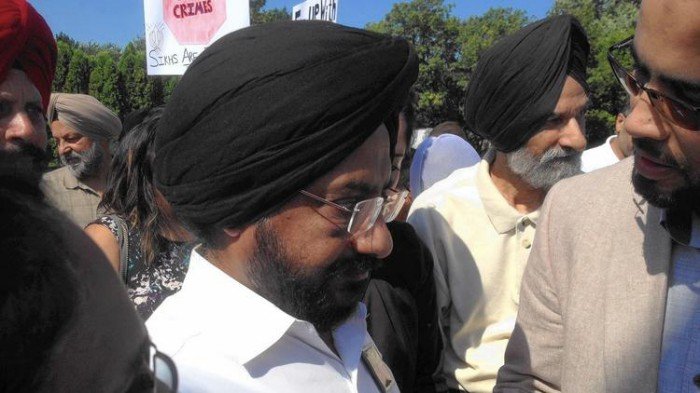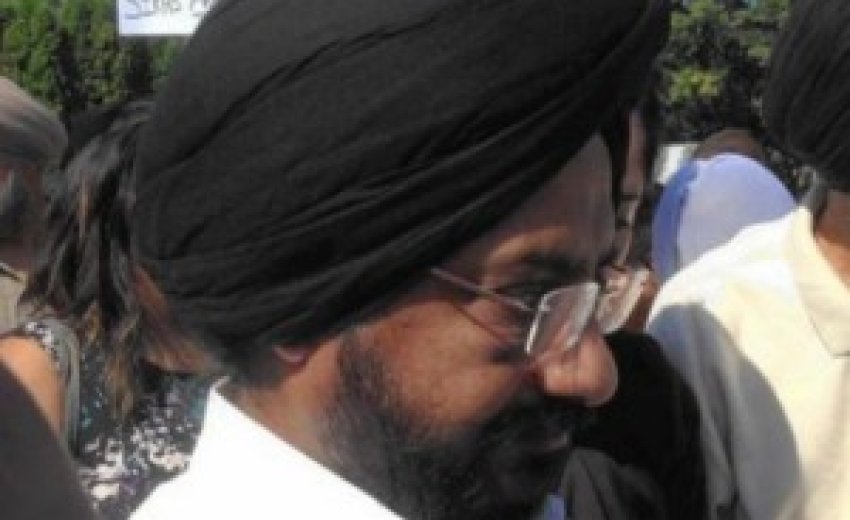 |
| Inderjit Singh Mukker, the Darien man who was beaten in his car Sept. 8, 2015, after a news conference held Sept. 15 along Cass Avenue where the attack occurred. (Kimberly Fornek, Chicago Tribune) |
The Willowbrook teenager who pleaded guilty to beating a Sikh man in a hate crime last September will serve 200 hours of community service over a two-year probation.
He also must attend high school everyday and undergo anger management, culture awareness and substance abuse counseling, and pay restitution to the victim for his medical bills, DuPage County Juvenile Court Judge Blanche Hill Fawell ruled Wednesday.
If he fails to complete the terms, he will be sentenced to 15 days in detention.
The teenager, a senior at Hinsdale Central High School, was 17 when the crime was committed and he was charged as a juvenile.
Inderjit Mukker of Darien said he was driving on Cass Avenue near 69th Street when the teenager tried to force him out of his lane and called him names such as Bin Laden and terrorist. Mukker has a beard and wears a turban, as is the custom for Sikh men. In his statement, Mukker said he pulled his vehicle over, but so did the teen, who then got out of his car. The teen punched him repeatedly in the face, until he passed out, Mukker said. The attack injured his eyes and fractured his cheekbone, said Mukker, who was taken to the hospital.
|
|
| Rally held for Sikh man attacked by teen. "No Sikh, no American should fear a simple trip to the grocery store," said Inderjit Singh Mukker on Sept. 15, 2015. The Willowbrook teen is now charged with a hate crime. (WGN-TV) |
For two months, Mukker said he could not work as a taxi driver. Seven months later, Mukker said he still cannot drive his taxi as many hours as he once did.
"My income has fallen dramatically," Mukker wrote in a statement read by Assistant State's Attorney Audriana Anderson. "I have fallen behind on my mortgage."
He also has struggled to pay his medical bills, he said.
The teenager, who has a job, will be required to pay Mukker about $4,870, which are the medical expenses his insurance did not cover, Mukker said.
"I feel my life has changed forever," Mukker wrote.
The teenager, who is 18 now, pleaded guilty to a hate crime in December. Initially, the state's attorney's office charged the teen as a juvenile with four felony counts of aggravated battery, saying the beating followed a road rage incident. The juvenile also was charged with one count of aggravated battery to a police officer.
The Sikh Coalition, a civil and human rights advocacy group, immediately objected and said they would pursue federal hate crime charges through the U.S. Department of Justice's civil rights division and the U.S. Attorney's Office. The coalition reported its legal team met with the members of the state's attorney's staff Sept. 14 and provided additional information that showed hatred was the primary motive for the attack.
"The importance of a hate crime charge was never about endorsing a harsher penalty for the assailant, but rather ensuring that our government agencies and the American public acknowledge the problem," Mark Reading-Smith, a spokesman for the coalition said after the sentencing. "Mr. Mukker's case is unfortunately not unique and we must continue to do more to combat this problem together as a nation."
The teen told Fawell he is looking forward to doing his community service in the Sikh community and regaining his image, because his behavior on Sept. 8 was out of character.
Mukker had asked that the teenager do some of his community service at a Sikh temple or in the Sikh community. Mukker said he wants the offender "to learn he cannot attack someone without provocation," or because of the person's race or religion.
"I don't know how you teach someone that, but I hope you will try," Mukker told the judge in his statement.
The teenager did not make excuses for his behavior, but when the judge asked him why he targeted Mukker, he said the only reason was because Mukker had cut him off and gestured at him.
The teenager's father described the troubles which may have contributed to his son's behavior, although, he, too, stressed he was not making excuses for the attack.
When his son was young, he became ill with a disease that paralyzed him, his father said. He eventually regained his ability to move, but the treatment he received included a form of electroshock, the father said. Subsequently, his son was diagnosed with post-traumatic stress syndrome, perhaps a side effect of the shock treatments. The parents also have had other health and financial difficulties.
"I just really wanted you to understand our circumstances," the father told the judge.
